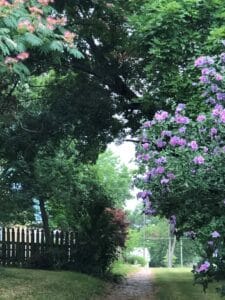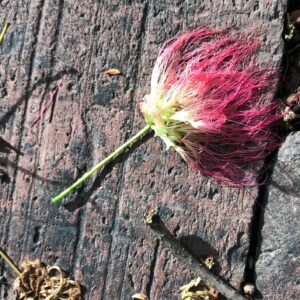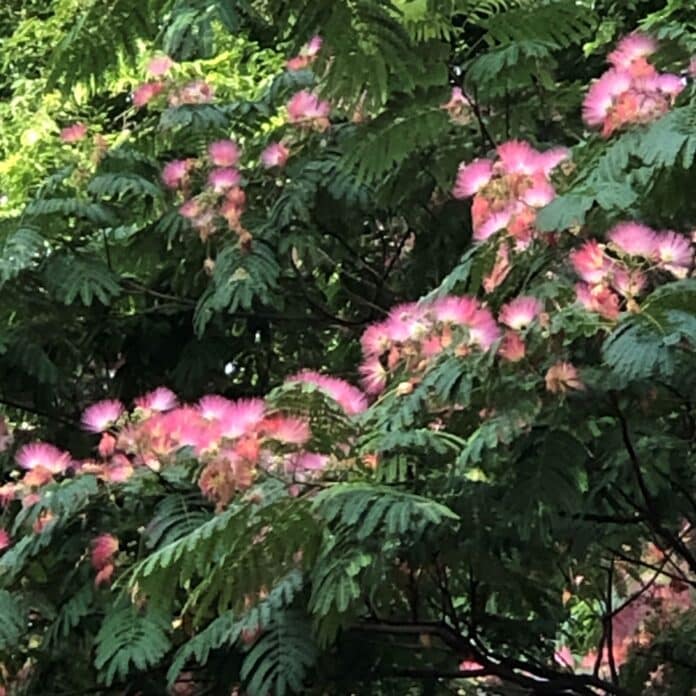In these curious times believing in magic is helpful. Magic can take us to another dimension—can lift our spirits and give us hope. Magic can cause us to believe in unexplored possibilities.
Every weekday morning, as my husband David heads off to his day job and before I climb the stairs to my studio office, I make a training walk with our three-year-old Aussie, Lasyrenn. Frequently we enjoy a sweet magical surprise as down Sycamore Street we amble, past the fire station and the Baptist Church. When traffic clears on Garrison Avenue, stepping off the extra high curb, we make the corner across from the Carthage Public Library then enter Central Park for our looking-scenting-photographing walk around.
Each season the scents are different. While Lasyrenn uses her nose to decipher the identity of other visitors past and present, I hold my nose up high—yearning to catch the next whiff of a pretty something that is asking to be noticed.
Sometimes my best scented gifts come long before we ever reach the park. Just the other day, only half a block from home, I went all tipsy and euphorically heady—overtaken by an aromatic sweetness descending down like fairy dust sprinkled from the canopy stretching over our neighbor’s herringboned brick walk.
Ah, the magic of mimosas! Yes, the scent of their rosy-pink blossoms can be as intoxicating as the popular mimosa cocktail made with champagne and orange juice and named after the yellow-flowered mimosa plant, Acacia dealbata. The combination of sparkling wines and orange juice has been enjoyed for centuries in Spain, especially where oranges and cava and other sparkling wines are plentiful.
 Here in Carthage the towering mimosa tree on my street and all the other lovely mimosas blooming this time of year throughout our town are descendants of Albizia julibrissin, the Persian silk tree or pink silk tree—a species of tree in the family Fabaceae, native to southwestern and eastern Asia. The genus is named after the Italian nobleman Filippo degli Albizzi, who introduced the exotic tree to Europe in the mid-18th century.
Here in Carthage the towering mimosa tree on my street and all the other lovely mimosas blooming this time of year throughout our town are descendants of Albizia julibrissin, the Persian silk tree or pink silk tree—a species of tree in the family Fabaceae, native to southwestern and eastern Asia. The genus is named after the Italian nobleman Filippo degli Albizzi, who introduced the exotic tree to Europe in the mid-18th century.
The magically intoxicating Mimosa blossoms decorating our neighbor’s giant tree were like hundreds of perfumed ornaments placed and arranged just so in a hairdo woven with strands of fern-like foliage above dozens of scented adornments fallen down over the walk and grassy lawn.
The mimosa perfume lingering long in my mind and my imagination appeared to go before and follow us all the way to and around the park and back home to a lovely cup of tea that seemed to be infused with the same Mimosa scent.
That morning’s surreal meandering set my mind to pondering the wonders of magic realism—that style of fiction and literary genre that paints a realistic view of the modern world while also adding magical elements. Magical Realism is familiar to us in literary and film classics in which realistic narrative and naturalistic technique are combined with surreal elements of dream or fantasy—“One Hundred Years of Solitude” by Gabriel García Márquez; “Beloved” by Toni Morrison; “The House of the Spirits” by Isabel Allende; “Like Water for Chocolate” by Laura Esquivel; and the “Harry Potter” novels by J. K. Rowling.
 Well-known artists who are considered strong followers and practitioners of Magic Realism art include Italian painters Felice Casorati, Giorgio de Chirico and Gian Paolo Dulbecco; German Alexander Kanoldt; Latin American Marcela Donoso; American Paul Cadmus, Joseph Cornell, Edward Hopper, Syd Baker and Colleen Browing; Armenian Gayane Khachaturian; Swiss Ricco Wassmer; Dutch Carel Willink; Belgian René Magritte and Mexican Frida Kahlo de Rivera.
Well-known artists who are considered strong followers and practitioners of Magic Realism art include Italian painters Felice Casorati, Giorgio de Chirico and Gian Paolo Dulbecco; German Alexander Kanoldt; Latin American Marcela Donoso; American Paul Cadmus, Joseph Cornell, Edward Hopper, Syd Baker and Colleen Browing; Armenian Gayane Khachaturian; Swiss Ricco Wassmer; Dutch Carel Willink; Belgian René Magritte and Mexican Frida Kahlo de Rivera.
In our very real pandemic world, how wonderful to remember the Magic of Mimosas and that a book or a painting or the scent of a blossom up high in a tree can transport us into soul-soothing dimensions of magical wonderment!
For a very real and magical outing be sure to visit the JASON SHELFER | SCULPTURAL SPECTACULAR— the free drive-through exhibition now on view at artCentral, 1110 East Thirteenth Street in Carthage!






